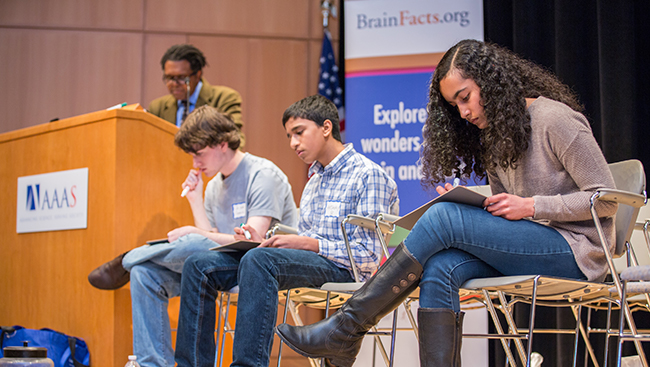
Participating in outreach activities is vital for all scientists. As an SfN member, I’ve had the opportunity to get involved in a variety of ways.
My favorite activities are judging the Brain Bee, mentoring Science Olympiads, and running demos at the USA Science and Engineering Festival.
I’ve enjoyed each of these experiences for the unique ways they’ve taught me to relate to different audiences.
The Brain Bee is mostly about interacting with bright high school students who are passionate about neuroscience. Science Olympiads are similar: Participants are scientifically minded and curious, but their interests go beyond neuroscience to a range of topics. In contrast, the Science and Engineering Festival, gathers the general public with a wide variety of interests and education levels. In this environment, I ran simple demonstrations of how the brain functions for young children and adults. These activities improved my ability to discuss science and helped me build my credentials as a young scientist.
Here’s what I’ve learned when preparing for outreach — no matter the age, background, or interests of the audience.
Expect a range of knowledge levels.
Some individuals will not know what a neuron is, and others will flawlessly describe anatomical structures of the brain. Be prepared to engage both types of people by:
- Avoiding complex scientific jargon (but don’t oversimplify).
- Assessing the knowledge level of the person you’re talking to before answering by paying attention to the complexity of questions asked and the audience present at the type of event where you are volunteering.
Prepare to be asked questions outside of your field of expertise.
Simple questions about common medical complaints, drug use, and anatomy often come up. Brushing up on your basic anatomy and common neurological diseases will give you confidence to answer.
Remember: When responding to medical questions, it is important to emphasize that you are not giving medical advice — and you can always pass on answering.
Familiarize yourself with neuroscience trends in the media.
There always seems to be a new neuroscience article or quiz circulating. You may have seen headlines like, “Are you right-brained or left-brained?” and “This new supplement cures Alzheimer’s!”
Be prepared to address these topics, which may include debunking popular but scientifically untrue sentiments or fleshing out the real science behind clickbait titles.
Be ready to suggest resources for further learning.
You are a valuable resource, but it isn’t possible to know the answer to every question. Suggest ways for people to learn more about a topic.
I recommend:
- Searching Google Scholar for peer-reviewed articles.
- Using BrainFacts.org for neuroscience information tailored to a lay audience.
- Contacting neuroscience researchers at local universities.
Neuroscience outreach to the public can seem intimidating at first, but with the right preparation, it will become second nature.








